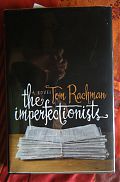
Tom Rachman
The Imperfectionists
Pausing my reading of Middlemarch, I picked up The Imperfectionists by Tom Rachman as something lighter to take on a short trip. Compared to George Eliot, Rachman feels like popcorn, that airy nonsubstance of it that takes a lot to fill you up. Maybe I shouldn’t be comparing Eliot to Rachman as the two writings are separated by over one hundred years, but yet, it’s disappointing.
When The Imperfectionists first came out a couple years ago its picture was plastered on lots of bookish sites, not only during the debut but for months after. Despite this, I didn’t realize until lately that it was based in Rome, which was my main motive for picking the book up. But even here it failed me.
Not that I wasn’t forewarned. When I borrowed The Imperfectionists from someone in my writing group, a conversation started to the effect that the Rome references were, basically, imperfect. And that came from more than one woman who has lived here for years. It’s rumored that instead of writing about Rome, Rachman wrote about the Paris he lived in as an expat and only used Rome to cover the identity of the characters.
I was put on my guard and began to pick out the mistakes: Bar stools in Caffe Greco (less probable in the 1950s), blue buildings, muffin papers? And why would you use the French word crèche when you’re in Italy and there’s the handy presepio? The carpet in the newsroom also bothered me—I’ve never seen such a floor covering, especially on the floor of a 17th century palazzo.
The problem is that Rome is significantly less cosmopolitan than Paris; Rome can’t compare to Parisian bustle. One can imagine an international paper functioning in Paris, being started after the war, while it’s not as easy to imagine that paper functioning in the confusion that is Rome. Not to say it’s not possible, after all there are three UN agencies here and they continue to work, but it’s a wonder that they are here in the first place.
The actual writing was unable to pick me out of nit-picking, and instead I turned my eye to that too. Each chapter is a vignette that could function as a short story detailing one moment in the life of a newspaper employee. They are quick-moving texts written in present tense and mostly void of exposition. The characters only become meaningful by the middle as the reader has gathered enough information to care about them. They are each imperfect, as the title suggests, which I thought was a clever theme but an ultimately dingy picture of life.
But it wasn’t all that bad. I liked the discussion about the decline of news in print, how some people hold on, especially when putting out a newspaper is their job. All in all, reading The Imperfectionists was a decent way to fill the time during my trip to France, which is the better country to read it in anyway.
· · · · · · · · · · · · · · · · · · · ·